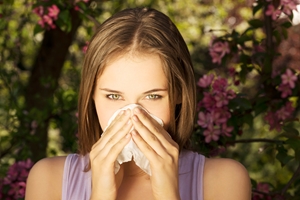
If you suffer from both seasonal allergies and asthma, this season may be worse for you than ever before. According to Good 4 Utah, allergies can complicate asthma symptoms, making them stronger and more apt to irritate you.
According to The Asthma and Allergy Foundation of America (AAFA), allergy-induced asthma is the most common form of asthma, affecting over 50 percent of the 20 million people who suffer from asthma in the U.S.
During an asthma attack, air stops moving freely into the airways due to:
- Cells that line the airways produce more mucus, causing a thicker obstruction to breathing
- Muscles surrounding the airways tighten, causing them to narrow
- The lining of the airways becomes swollen and inflamed.
Seasonal allergy symptoms, such as coughing, labored breathing, sneezing or watery eyes, can make asthma worse. Asthma can induce a panic-like episode, as the person feels as if he or she cannot breathe, making it even more difficult to take in air.
Allergy-induced asthma can develop at any point in someone's life, especially if he or she has always been sensitive to allergens.
Take the following three steps to protect yourself this season:
- Control your environment: Use hypoallergenic bedding and bed covers, remove rugs and other known irritants.
- Get tested: If you know your triggers, you can protect yourself against them. Being able to self-medicate and take preventative medicine could help alleviate symptoms and possibly prevent future asthma attacks.
- Test your home: Your home, especially in high-traffic areas such as your bedroom and kitchen, could be hiding potential irritants. Check for any allergy-causing pests such as cockroaches and irritants such as mold.
For more allergy prevention tips or products available for prevention purposes, visit our website.









